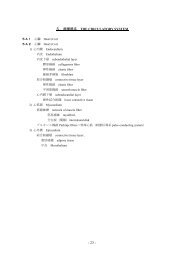Program / Abstract Book - KMU WWW3 Server for Education ...
Program / Abstract Book - KMU WWW3 Server for Education ...
Program / Abstract Book - KMU WWW3 Server for Education ...
Create successful ePaper yourself
Turn your PDF publications into a flip-book with our unique Google optimized e-Paper software.
No. 13 (PC 13)<br />
Effects of alpha lipoic acid as an antioxidant in preventing renal mitochondrial<br />
oxidative damage in diabetic rats<br />
Noraihan Mat Harun, Rahajoe Imam Santosa<br />
Department of Basic Medical Sciences, Kulliyyah of Medicine, International Islamic University,<br />
Malaysia, Kuantan-Malaysia<br />
Diabetes mellitus is a metabolic disorder characterized by chronic hyperglycemia due to inadequate<br />
secretion of insulin or insufficient action of the endogenous insulin. Oxidative stress has an important<br />
role in the pathogenesis of diabetic complications and mitochondria represent a major source of the<br />
reactive oxidants that lead to cellular oxidative damage. This study is design to observe the effect of<br />
alpha lipoic acid (ALA) as mitochondrial antioxidant in preventing renal mitochondrial oxidative<br />
damage in diabetic induced rats. In this study, the rats were divided into three groups. Normal Control<br />
(NC) group was served as a control; Diabetic Control (DC) group was induced <strong>for</strong> diabetes without<br />
given any supplementation, while Diabetic-Alpha Lipoic Acid (D-ALA) group was<br />
streptozotocin-induced diabetic rats, supplemented with ALA daily <strong>for</strong> six weeks. The ability of ALA in<br />
preventing renal mitochondrial oxidative damage was evaluated by comparing the renal function in<br />
terms of serum urea, serum creatinine and creatinine clearance in both supplemented and<br />
non-supplemented rats, as well as mitochondrial H2O2 concentration and GSH/GSSG ratio as parameters<br />
<strong>for</strong> the oxidative stress. The results showed that ALA capable to ameliorate the defective antioxidant<br />
defense system leads to modulate the oxidative stress in terms of lower H2O2 concentration and higher<br />
GSH/GSSG ratio in D-ALA group compared with DC group. However the significant reduction of<br />
oxidative stress did not correlate well with the renal function parameters, in which only showed<br />
significant improvement of serum urea, but not serum creatinine or creatinine clearance. In conclusion,<br />
ALA treatment capable to ameliorate the defective antioxidant defense system and modulate the<br />
oxidative stress, but partially preventing the progression of renal dysfunction in diabetic rats.<br />
- 66 -



